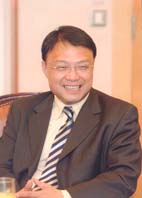编者按:北京大学国际战略研究中心朱锋副主任近日接受了澳大利亚罗伊研究所的采访,原文可见http://www.lowyinterpreter.org/post/2011/10/18/Through-Chinese-eyes-Zhu-Feng.aspx 全文如下:
Through Chinese eyes: Zhu Feng
by Peter Martin & David Cohen - 18 十月 2011 2:02下午

Interview with Zhu Feng, an internationally renowned expert on North Korea and nuclear disarmament, by Peter Martin and David Cohen. Peter and David are conducting a series of interviews with Chinese academics and journalists, using reader-submitted questions. Part II will come later this week.
From Peter and David: What is your assessment of China's current policies towards North Korea?
China's North Korea policy has usually been focused on two concerns. One is the stability of North Korea. The other is denuclearisation. Beijing really wants denuclearisation to move forward without resulting in a quick unmanageable and chaotic collapse of North Korea. If this situation happened then China would be very negatively affected because we are the only country with a long border which could be easily crossed by refugees. Therefore, China's policy towards North Korea has been struggling between these two aims, pushing hard for denuclearisation and meanwhile also somehow preserving the status quo.
But, in reality, this policy is getting harder and harder to maintain because North Korea won't stop its provocations. There is also deepening suspicion that North Korea never truly intends to give up its nuclear weapons. Now China is facing a dilemma where the unwillingness of North Korea to give up nuclear weapons might lead to its collapse under international pressure and isolation. I think therefore that China's policy on North Korea requires a complete overhaul to make it relevant to these changing dynamics.
From Anna: Bearing in mind that a number of Chinese nationalisms exist, what place does North Korea take in the arguments of Chinese nationalists?
First of all, China shed a lot of blood in the Korean War securing China's national security and countering America's military expansion in East Asia. Such Chinese blood is hard to forget. So far, the bravery of China's volunteer troops remains a great reminder for Chinese people to be reminiscent of the hard times they went through when China had just been founded.
Most Chinese are very proud of the heroic fighting mission to safeguard the country because, 61 years ago, the US was overwhelmingly predominant over our nation. The bravery of Chinese troops in the Korean War is always a fuel for Chinese patriotism. Such things always make the Chinese feelings about our relations with North Korea very complex. On the one hand, most Chinese dislike the Kim Jong Il regime, but on other hand the territory was immersed with Chinese blood so no one wants to see that wasted. Chinese sentiments are very complex.
From Jon: What does Professor Zhu Feng think of the forced repatriation of refugees back to North Korea where they are either imprisoned or executed?
I think it's a controversial issue, but the problem is that if China refuses to repatriate that would signal that Beijing wants to bring down the North Korean regime. So I know such repatriation is cold blooded, and it's a big embarrassment for China's policy on North Korea. I have to say, China's policy implementation in this regard always keeps one eye open the other eye closed. Officially, we will repatriate, but in practice we keep the net quite loose.
From Jon: Would China support a united Korean peninsula under democratic rule?
Of course. A democratic North Korea may sound a little bit difficult for China, but the democratisation of North Korea will ultimately lay out the way for Pyongyang to become more included in and locked into the international system. It will also show great promise for North Korea's reintegration into the world community, following the Chinese way of reform and opening. I totally believe that only reforming and opening up North Korea will persuade it to give up its nuclear weapons in exchange for international recognition, energy aid, and the lifting of sanctions. So the democratisation of North Korea is almost the equivalent of reform and opening and is welcome on the Chinese side.
From Jnuccio: Would China support this: Chinese armed forces stay out of Korea forever; the DPRK is abolished, with its territory and people incorporated into the ROK; American forces leave Korea, never to return?
Why not? But if American troops were there, it would be more difficult to accept. It would also depend on whether US military involvement was mandated or was some kind of unilateral intervention. China would respond very differently to these situations. If the action was unilateral, Beijing wouldn't be stood alone — the DPRK is a UN member. It is also a neighbor of China so any unilateral action would unbelievably arouse China's mounting anxieties and may even trigger some sort of military response from the Chinese side.